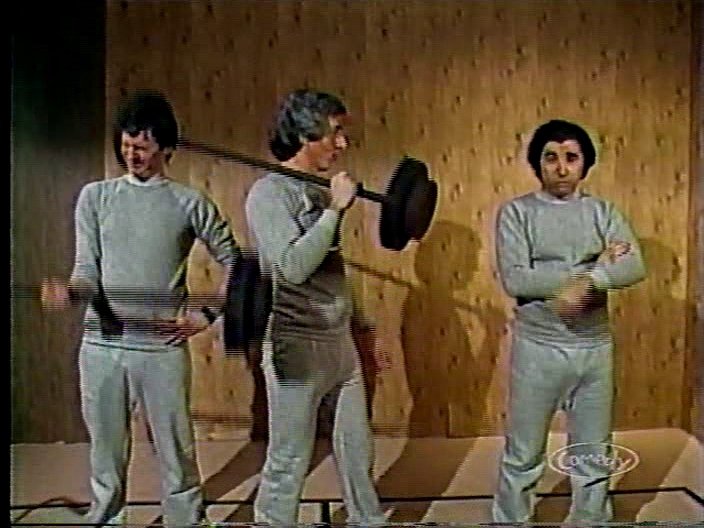
Existentialist Weightlifting
Classic SNL Review: April 13, 1985: Howard Cosell / Greg Kihn (S10E17)
Sketches include “Do You Know What I Hate? (VI)”, “Hospital”, “Inside Out”, “Run, Throw & Catch Like A Girl Olympics”, “Bar Mitzvah”, “Sports Beat”, “Fernando’s Hideaway”, “Red Guys Rap” and “Good Sex with Dr. Ruth Westheimer”. Greg Kihn performs “Boys Won’t (Leave The Girls Alone)” and “Lucky”.
Classic SNL Review: January 19, 1985: Roy Scheider / Billy Ocean (S10E11)
Sketches include “Inauguration”, “Super Sunday”, “Scalper”, “In Praise of Women”, “The Flaming Parrot”, “Good Cop, Bad Cop” and “Mental Hospital. Billy Ocean performs “Caribbean Queen” and “Loverboy”. Steven Wright also performs.
Classic SNL Review: December 8, 1984: Ringo Starr / Herbie Hancock (S10E08)
Sketches include “Beatles Auction”, “Unlucky Man”, “Do You Know What I Hate?”, “Ringo’s Buyers”, “Strictly From Blackwell”, “Massacre on 34th Street”, “Reverse Psychology”, “Fernando’s Hideaway” and “Draft Dodger”. Herbie Hancock & The Rockit Band perform “Junku” and “Rockit”.
Classic SNL Review: November 17, 1984: Ed Asner / The Kinks (S10E06)
Sketches include “Rescue Mission”, “Walking After Midnight (Wing Tips)”, “Thanksgiving”, “60 Minutes”, “Me and Julio”, “Bowling”, “Tippi Turtle”, “You Can’t Put Too Much”, “Public Service Announcement”, and “Peter Pan”. The Kinks perform “Do It Again” and “Word of Mouth”.
Classic SNL Review: October 20, 1984: Rev. Jesse Jackson / Andrae Crouch, Wintley Phipps (S10E03)
Sketches include "Advice", "Do You Know What I Hate?", "The Question Is Moot!", "Refrigerator Magnet Safety Advisory Board", "Just Kidding", "First Class", "Tippi Turtle", "Wrong Voice, Right Face", "Funny Black People", "Jeane", "Rich Hall's Election Report", "Fashion Report" and "Rainbow Coalition". Andrae Crouch performs "Right Now" and Wintley Phipps performs "Tell Me Again".
Classic SNL Review: October 6, 1984: (no host) / Thompson Twins (S10E01)
Sketches include: "Lifestyles of the Relatives of the Rich & Famous", "Return of the Torch", "Rich Hall's Election Report", "Wheel of Fortune Interview", "Grandpa Howard", "Synchronized Swimming", "Mondale & Ferraro", "The Bulge", "First Draft Theater", and "Book Beat". Thompson Twins perform "Hold Me Now" and "The Gap".
Classic SNL Review: January 21, 1984: Michael Palin and his mother / The Motels (S09E10)
Sketches include "Donahue", "Boy George Burns: The Man and His Music", "Mister Robinson's Neighborhood", "Powerful Living Snaps", "Man On A Chain", "Mick Pitwhistle Does It All", "That's Okay", "Shoplifter", "Would You Believe It (3 parts)", "House Of Mutton", "Save Lots of Plankton", and "A Boy's Life on the Mississippi". The Motels perform "Suddenly Last Summer" and "Remember The Nights".






